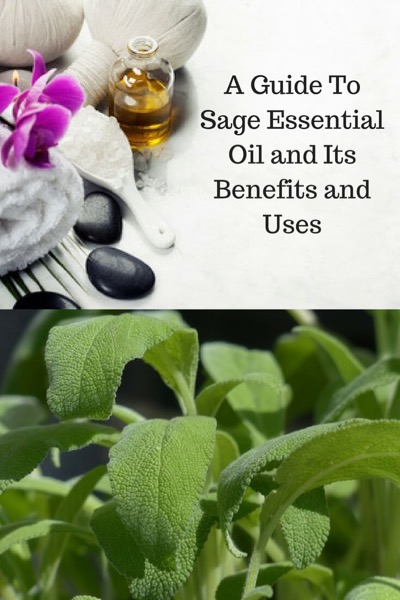- Home
- Essential Oil Profiles
- Sage Essential Oil
As an affiliate for Bookshop, Amazon, and other programs, I may earn a small commission for products purchased through links. This doesn't affect the price you pay. Privacy policy and disclosures.
Search this site:
Guide to Sage Essential Oil Benefits and Uses
"Sage is a protective spirit for those who are not afraid of the spiritual forces or the force of unseen beings," writes aromatherapist Valerie Ann Worwood in Aromatherapy For the Soul. She says the emotional benefits of sage essential oil (Salvia officinalis) are to encourage strength, courage, perseverance, grounding, and protection. Its spiritual benefits is to help "integrate a spirit that has the majesty of the heavens behind it."

This profile looks at Salvia officinalis, also called dalmatian, common, or garden sage. Other varieties of sage oil are available, though less commonly used in aromatherapy, and have different properties. These varieties include African wild sage (Tarchonanthus camphoratus), blue mountain sage (Salvia stenophylla), white mountain sage (Hemizygia petiolata), Greek sage (Salvia fruticosa), Spanish sage (Salvia lavandulaefolia), and white sage (Salvia apiana).
Do not confuse sage with clary sage (Salvia sclarea), which is a different oil with different properties.
Basic Sage Facts
Plant family: Lamiaceae
Production: Steam distilled from the leaves of the sage plant
Aroma: Spicy, sharp, herby.
Perfume/aromatic note: Top.
Is sage safe to use during pregnancy? No.
Is sage safe for children? Do not use with children under age 10 is commonly offered advice.
Cautions:
- Sage contains a neurotoxic ketone called thujone, which is why pregnant/nursing women and children should avoid this essential oil.
- Avoid sage if you have epilepsy, are prone to seizures, or have other nervous system problems.
- Some sources advise against the use of sage by people with high blood pressure.
- May cause skin irritation. Spot test before using on a large area.
Main components:
- camphor 7.5–50.2%
- alpha-thujone 13.1–48.5%
- borneol 1.5–23.9%
- 1,8-Cineole 1.8–21.7%
Source: Essential Oil Safety, 2nd Ed.
Note: "Enterprising distillers have found a way around the high ketone content in sage essential oil," according to The Healing Intelligence of Essential Oils. "Distilling sage early in its life cycle, when the leaves are still very small, yields an oil with very low thujone content."
Sage Aromatherapy Benefits
Aromatherapy: A Complete Guide to the Healing Art: Sage tames the oiliness of oily skin and hair, helps heal acne, and reduces perspiration. The oil may also encourage hair growth.
The Complete Book of Essential Oils and Aromatherapy: Uses for sage essential oil include helping relieve:
- Muscle aches, pains, and injuries
- Painful joints
- Menstrual cramps
- Menopausal symptoms (including hot flashes)
- Heavy, tired legs
- Excessive perspiration
375 Essential Oils and Hydrosols: Use sage in moderation in massage blends for muscle aches and pains.
The Complete Guide to Aromatherapy, Third Edition, Vol. 1: Energetically, sage is drying and astringent. The oil helps tonify the Qi, warm the Lungs, and dispel wind-cold. The oil is recommended for conditions associated with physical and mental fatigue, poor focus and memory, conditions associated with chronic cough, sinus congestion.
- The rasa (taste) of sage is pungent, bitter, astringent; the vipaka (aftertaste) is pungent; and the virya (energy) is heating and drying.
- The oil decreases vata and kapha and increases pitta.
- Tissues most affected by the oil are plasma, blood, nerve, skin, kidneys, heart, immune, endocrine, and gums.
- Indications for this essential oil include colds, flu, sore throat, laryngitis, swollen glands, night sweats, hair loss, nervous dysfunction, and gum infections.
Subtle Aromatherapy: Using sage with meditation or visualization might support developing wisdom.
The Essential Guide to Aromatherapy and Vibrational Healing: Spiritually, sage clears negative energy from space and from your personal energy field. On a vibrational level, use the essential oil to break down old, repetitive ways of thinking. Sage destabilizes negativity associated with challenging memories or experiences.
Mixing Essential Oils for Magic: Sage gives you focus and stability for divination, clairvoyance, and psychic work. The oil has a grounding energy that clears negativity and supports ritual purification.
Sage Essential Oil Uses and Blends
Use sage in an aromatherapy diffuser to calm nerves, stimulate memory, or help relieve grief and depression. Because sage is strong, limit diffusion time to 30 minutes three times a day.
Burning dried sage is a time-honored method to clear and cleanse a space. You could also diffuse sage or make a room spray by combining the essential oil with distilled water.
For menstrual cramp relief:
- 2 drops sage
- 2 drops lavender essential oil
- 3 drops geranium essential oil
- 1 drop peppermint essential oil
- 1 tablespoon carrier oil
Source: 10 Recipes with Sage Essential Oil by Suzanne Banks
Oily hair treatment:
Add 1 drop sage essential oil to 1 teaspoon coconut oil or jojoba oil. Massage the blend into your oily hair. Wait about 10 minutes and then shampoo as usual.
Massage oil for sore muscles:
- 5 drops sage essential oil
- 5 drops rosemary essential oil
- 8 drops copaiba essential oil
- 2 drops peppermint essential oil
- 4 tablespoons jojoba or other carrier oil
Blend all ingredients in a glass bottle. Massage a little into sore muscles as needed.
Make a mouthwash:
- Add 1 drop sage oil to 1 teaspoon glycerine or calendula tincture.
- Stir the blend into 1/2 cup water.
- Use it to rinse your mouth and gums, making sure to spit it out.
Source: Essential Oils: All Natural Remedies and Recipes
Buy essential oils at Aromatics International or Rocky Mountain Essential Oils.
Buy massage supplies at Massage Naturals.
Aromatherapy for Massage Therapists Course.


